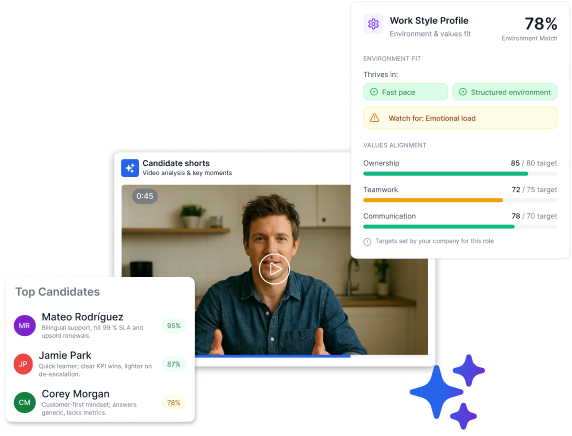Hiring in retail and service industries presents unique challenges. Retail teams often face large volumes of applicants, frequent turnover, and tight seasonal deadlines. Traditional hiring methods can slow down the process and lead to inconsistent results.
AI interview software is now being used to help teams manage hiring at scale. These tools automate parts of the interview process, helping teams screen candidates more efficiently. For businesses with many roles to fill quickly, AI can support faster decision-making while keeping hiring standards consistent.
This guide breaks down the best AI-assisted screening platforms built for retail teams in 2026. It also outlines what to look for in interview intelligence platforms and includes a review of 12 tools to consider in 2026.
Why AI matters for retail mass hiring
AI-assisted candidate screening software use machine learning and natural language processing to help teams review candidates, surface key information, and coordinate scheduling. In retail and service industries, where hiring often involves hundreds of applicants, these tools help manage volume efficiently.
Mass hiring in retail comes with specific obstacles. Hiring managers often need to fill multiple positions within short timeframes, especially during seasonal peaks. High turnover also makes it difficult to maintain a consistent pipeline of qualified candidates.
AI tools address these challenges by processing applications at scale. For example, some platforms can surface key information from thousands of responses in minutes, helping teams prioritize who to review first.
Key benefits of AI in retail hiring include:
- Time savings: AI reduces time-to-hire by automating resume screening and initial assessments
- Cost efficiency: Lower recruitment costs by reducing manual labor and agency fees
- Better matches: AI helps connect candidates to job requirements using data analysis
- Fair process: Standardized evaluations across all applicants promote consistency
Key features for an interview intelligence platform
An interview intelligence platform is software that helps employers analyze and improve the interview process using artificial intelligence. For retail and service industry mass hiring, these platforms handle large-scale recruitment by automating interviews and providing structured evaluations.
Essential features for retail hiring include:
- AI-assisted screening: Surfaces candidates who align with job requirements for human review
- Video interviews: Allows candidates to record responses on their own time
- AI-resistant assessments: Measures personality, situational judgment, and environment fit—traits candidates can't fake with AI
- Candidate scoring: Ranks applicants using consistent criteria
- Scheduling tools: Coordinates interviews without manual back-and-forth
- ATS integration: Connects with existing applicant tracking systems
- Mobile access: Lets candidates interview using smartphones
- Multi-location support: Organizes hiring across different stores
These features help retail teams process more applications in less time. Video interviewing solutions let candidates complete assessments outside store hours, while automated scoring ensures everyone is evaluated using the same standards.

How AI mapping reduces bias And enhances candidate experience
AI mapping in hiring refers to how artificial intelligence systems structure, analyze, and match candidate responses to job requirements. It uses algorithms to align skills and experiences with role needs based on data patterns.
This method uses standardized questions and consistent evaluation criteria across all candidates.
In retail and service industries, candidates often interact with the brand as both job seekers and customers. A poor interview experience can affect purchasing behavior, while a respectful process helps maintain customer trust.
Bias reduction techniques in AI interview systems include:
- Structured interviews: AI platforms deliver the same questions to every applicant
- Blind screening: Systems can evaluate candidates without considering names or photos
- Consistent scoring: All applicants are rated using the same metrics
By asking every candidate the same questions and evaluating them through consistent criteria, the process becomes more structured and transparent.
These approaches help create a more consistent process for all candidates while improving the overall experience. When applicants feel they've been evaluated fairly, they're more likely to maintain a positive view of the company—whether they're hired or not.

What to consider before choosing AI interview software
When selecting asynchronous interview software for retail hiring, consider your specific business needs, hiring volume, and existing systems.
Start by answering these key questions:
- How many applicants do you process monthly?
- How many locations will use the software?
- What hiring steps are currently manual?
- What systems (like ATS or HRIS tools) do you already use?
- What is your budget per hire or per month?
Budget requirements vary by business size. Small retailers might spend a few hundred dollars monthly, while large chains invest in comprehensive solutions with advanced features. Some platforms charge per hire, while others use subscription models.
Implementation timelines vary by vendor and integration scope—ask each provider for their typical onboarding timeline.
Integration with existing systems matters too. Many retail employers already use applicant tracking systems, payroll software, or scheduling tools. AI interview platforms typically connect through APIs or pre-built connectors.
Different sized retailers have different needs:
| Retailer type | Locations | Key considerations |
|---|---|---|
| Small retailers | 1–5 | Simple setup, low cost, mobile access |
| Mid-size chains | 6–50 | Multi-location support, ATS compatibility |
| Enterprise retailers | 50+ | Full integration, custom workflows, compliance features |
For seasonal hiring periods, look for software with batch processing and temporary license options to handle short-term volume increases.
11 best AI interview software for mass retail hiring
These platforms are designed to support high-volume hiring in retail and service environments. Each offers AI-driven features to streamline interviews and help teams manage large applicant pools.
1. HireVue
HireVue provides video interviewing and game-based assessments for large retail enterprises.
- Key Features: Video analysis, skill assessments, structured interviews
- Best For: Large retailers with multiple locations
- Retail-Specific Capabilities: Handles high-volume hiring and seasonal peaks
2. Truffle
Disclosure: This article is published by Truffle. We've included ourselves in this list where relevant, but have aimed to provide useful context on the broader category.
Truffle helps recruiting teams quickly build ranked shortlists using async video interviews, AI-resistant assessments (Personality, SJT, Environment Fit), AI candidate summaries, and match scores.
- Key Features: AI-resistant assessments (Personality, SJT, Environment Fit), AI candidate summaries and match scores, async video interviews, mobile-friendly completion
- Best For: Recruiting teams who need to screen every applicant without phone-screening all of them
- Retail-Specific Capabilities: Surfaces who's worth talking to for high-volume roles like cashiers, stockers, and shift leads—without phone-screening a huge volume of applicants per role
3. Phenom
Phenom includes AI chatbots and automated scheduling, making it useful for seasonal hiring periods.
- Key Features: Conversational AI, automated follow-ups, candidate ranking
- Best For: Retailers with seasonal hiring needs
- Retail-Specific Capabilities: Scales up during high-volume periods
4. ModernHire
ModernHire offers pre-hire assessments and predictive analytics for complex hiring processes.
- Key Features: Predictive models, structured video interviews, skills testing
- Best For: Large retail chains with standardized hiring
- Retail-Specific Capabilities: Role-specific assessments for different positions
5. OutMatch
OutMatch combines video interviews with personality assessments to match candidates to frontline roles.
- Key Features: Personality evaluation, video interviews, role matching
- Best For: Service-focused retailers
- Retail-Specific Capabilities: Identifies traits suited for customer service
6. myInterview
myInterview provides simple video interviews with AI scoring, emphasizing ease of use.
- Key Features: Video responses, branded interview pages, simple setup
- Best For: Small to mid-sized retailers
- Retail-Specific Capabilities: Mobile-friendly for on-the-go candidates
7. XOR
XOR offers AI chatbots and multilingual support for diverse hiring needs.
- Key Features: Chat-based screening, multiple language options, SMS follow-ups
- Best For: Retailers with diverse language requirements
- Retail-Specific Capabilities: Connects with candidates in their preferred language
8. Vervoe
Vervoe focuses on skills-based assessments and job simulations.
- Key Features: Role simulations, skills testing, performance ranking
- Best For: Retailers needing to verify specific skills
- Retail-Specific Capabilities: Tests for cashier, sales, and inventory management skills
9. Harver
Harver automates volume hiring and includes realistic job previews to set expectations.
- Key Features: Workflow automation, job previews, fit predictions
- Best For: High-turnover retail environments
- Retail-Specific Capabilities: Helps reduce early turnover through clear expectations
10. VidCruiter
VidCruiter provides video interviews with compliance features for regulated retail sectors.
- Key Features: Compliance tools, custom branding, structured evaluation
- Best For: Pharmacy, financial, or other regulated retail
- Retail-Specific Capabilities: Maintains compliance while streamlining hiring
11. HireEZ
HireEZ focuses on finding and engaging candidates for hard-to-fill retail positions.
- Key Features: AI sourcing, candidate outreach, talent mapping
- Best For: Retailers struggling with applicant shortages
- Retail-Specific Capabilities: Helps build pipelines for challenging roles
Tips to integrate AI with your existing ATS
An applicant tracking system (ATS) is software that manages the hiring process from job posting to onboarding. Connecting AI interview software with your ATS helps maintain a smooth workflow and keeps candidate data organized.
1. Map your current process
Start by documenting your hiring steps from beginning to end. Look for repetitive tasks that could be automated, like initial resume screening or basic qualification checks.
List each step in your process:
- Job posting
- Application collection
- Initial candidate screening
- Interview scheduling
- Candidate evaluation
- Offer management
- Onboarding preparation
Identifying manual steps helps determine where AI can add the most value.
2. Check system compatibility
AI interview platforms connect to ATS systems through technical links called APIs or webhooks. These connections allow the systems to share data and update candidate information automatically.
Common retail ATS platforms include Greenhouse, Workable, and BambooHR. When evaluating AI interview software, ask:
- Does it integrate directly with your current ATS?
- What information transfers between systems?
- How often does data sync between platforms?
- Is technical support available during setup?
Compatibility issues can create extra work, so confirming these details early helps avoid problems later.
3. Prepare your team
Training should cover both systems working together. Show team members how to:
- Access the AI platform through your ATS
- Review candidate scores and interview recordings
- Move applicants through hiring stages
- Troubleshoot common issues
For retail teams working across different shifts and locations, create simple guides that anyone can follow. Short video tutorials often work better than written instructions.
4. Start small and expand
Begin with a test group before rolling out to all locations. Choose stores with:
- Consistent hiring needs
- Managers comfortable with technology
- Stable operations
Track results during the test period, including:
- Time saved per hire
- Manager feedback on candidate quality
- Technical issues encountered
Use these insights to improve the process before expanding to additional locations.
How to analyze ROI for AI driven interviews
Return on investment (ROI) for AI interview software means measuring the benefits gained compared to the cost. For retail hiring, this includes time saved, quality improvements, and reduced turnover.
Four key areas to measure include:
- Cost per hire: Compare what you spent before and after implementing AI
- Time to fill positions: Track how quickly roles are filled using the new system
- Quality of new hires: Evaluate performance ratings of employees hired through AI
- Employee retention: Monitor how long new hires stay with the company
The timeline to see measurable results varies depending on hiring volume and business size.
To calculate your own ROI, collect data on:
- Current hiring costs and timeframes
- System implementation expenses
- Performance metrics for new employees
- Retention rates before and after implementation
These measurements help determine whether the AI system is delivering value for your specific retail operation.
What to do next
AI-assisted screening platforms help organize large-scale hiring by surfacing key information for human review, coordinating scheduling, and supporting structured evaluation. These systems reduce manual effort, apply consistent criteria, and support faster decisions. For retail and service industries, this helps manage regular hiring cycles across multiple locations.
The technology continues to evolve, with new features like interview summaries and structured evaluation tools becoming more common. Note: Truffle does not analyze vocal tone, emotional state, or predict retention outcomes.
Frequently asked questions about AI interview software
How do these platforms handle multilingual screening for diverse retail workforces?
Many AI interview platforms include translation tools that support multiple languages, allowing candidates to complete interviews in their preferred language while providing consistent evaluation for hiring teams.
What security measures protect candidate data in AI interview systems?
AI interview platforms typically use encryption and access controls to protect candidate information throughout the hiring process. Verify specific compliance certifications (GDPR, SOC 2) with each vendor.
How can retailers measure the effectiveness of AI interview software?
Retailers can track metrics like time-to-hire, cost-per-hire, quality of hires (through performance ratings), and retention rates to evaluate how well the AI system improves their hiring outcomes.
Do AI interview platforms work for seasonal retail hiring spikes?
Yes, AI interview platforms are designed to handle volume fluctuations, making them well-suited for seasonal hiring periods when retailers need to process many applications quickly while maintaining consistent evaluation standards.
The TL;DR
Hiring in retail and service industries presents unique challenges. Retail teams often face large volumes of applicants, frequent turnover, and tight seasonal deadlines. Traditional hiring methods can slow down the process and lead to inconsistent results.
AI interview software is now being used to help teams manage hiring at scale. These tools automate parts of the interview process, helping teams screen candidates more efficiently. For businesses with many roles to fill quickly, AI can support faster decision-making while keeping hiring standards consistent.
This guide breaks down the best AI-assisted screening platforms built for retail teams in 2026. It also outlines what to look for in interview intelligence platforms and includes a review of 12 tools to consider in 2026.
Why AI matters for retail mass hiring
AI-assisted candidate screening software use machine learning and natural language processing to help teams review candidates, surface key information, and coordinate scheduling. In retail and service industries, where hiring often involves hundreds of applicants, these tools help manage volume efficiently.
Mass hiring in retail comes with specific obstacles. Hiring managers often need to fill multiple positions within short timeframes, especially during seasonal peaks. High turnover also makes it difficult to maintain a consistent pipeline of qualified candidates.
AI tools address these challenges by processing applications at scale. For example, some platforms can surface key information from thousands of responses in minutes, helping teams prioritize who to review first.
Key benefits of AI in retail hiring include:
- Time savings: AI reduces time-to-hire by automating resume screening and initial assessments
- Cost efficiency: Lower recruitment costs by reducing manual labor and agency fees
- Better matches: AI helps connect candidates to job requirements using data analysis
- Fair process: Standardized evaluations across all applicants promote consistency
Key features for an interview intelligence platform
An interview intelligence platform is software that helps employers analyze and improve the interview process using artificial intelligence. For retail and service industry mass hiring, these platforms handle large-scale recruitment by automating interviews and providing structured evaluations.
Essential features for retail hiring include:
- AI-assisted screening: Surfaces candidates who align with job requirements for human review
- Video interviews: Allows candidates to record responses on their own time
- AI-resistant assessments: Measures personality, situational judgment, and environment fit—traits candidates can't fake with AI
- Candidate scoring: Ranks applicants using consistent criteria
- Scheduling tools: Coordinates interviews without manual back-and-forth
- ATS integration: Connects with existing applicant tracking systems
- Mobile access: Lets candidates interview using smartphones
- Multi-location support: Organizes hiring across different stores
These features help retail teams process more applications in less time. Video interviewing solutions let candidates complete assessments outside store hours, while automated scoring ensures everyone is evaluated using the same standards.

How AI mapping reduces bias And enhances candidate experience
AI mapping in hiring refers to how artificial intelligence systems structure, analyze, and match candidate responses to job requirements. It uses algorithms to align skills and experiences with role needs based on data patterns.
This method uses standardized questions and consistent evaluation criteria across all candidates.
In retail and service industries, candidates often interact with the brand as both job seekers and customers. A poor interview experience can affect purchasing behavior, while a respectful process helps maintain customer trust.
Bias reduction techniques in AI interview systems include:
- Structured interviews: AI platforms deliver the same questions to every applicant
- Blind screening: Systems can evaluate candidates without considering names or photos
- Consistent scoring: All applicants are rated using the same metrics
By asking every candidate the same questions and evaluating them through consistent criteria, the process becomes more structured and transparent.
These approaches help create a more consistent process for all candidates while improving the overall experience. When applicants feel they've been evaluated fairly, they're more likely to maintain a positive view of the company—whether they're hired or not.

What to consider before choosing AI interview software
When selecting asynchronous interview software for retail hiring, consider your specific business needs, hiring volume, and existing systems.
Start by answering these key questions:
- How many applicants do you process monthly?
- How many locations will use the software?
- What hiring steps are currently manual?
- What systems (like ATS or HRIS tools) do you already use?
- What is your budget per hire or per month?
Budget requirements vary by business size. Small retailers might spend a few hundred dollars monthly, while large chains invest in comprehensive solutions with advanced features. Some platforms charge per hire, while others use subscription models.
Implementation timelines vary by vendor and integration scope—ask each provider for their typical onboarding timeline.
Integration with existing systems matters too. Many retail employers already use applicant tracking systems, payroll software, or scheduling tools. AI interview platforms typically connect through APIs or pre-built connectors.
Different sized retailers have different needs:
| Retailer type | Locations | Key considerations |
|---|---|---|
| Small retailers | 1–5 | Simple setup, low cost, mobile access |
| Mid-size chains | 6–50 | Multi-location support, ATS compatibility |
| Enterprise retailers | 50+ | Full integration, custom workflows, compliance features |
For seasonal hiring periods, look for software with batch processing and temporary license options to handle short-term volume increases.
11 best AI interview software for mass retail hiring
These platforms are designed to support high-volume hiring in retail and service environments. Each offers AI-driven features to streamline interviews and help teams manage large applicant pools.
1. HireVue
HireVue provides video interviewing and game-based assessments for large retail enterprises.
- Key Features: Video analysis, skill assessments, structured interviews
- Best For: Large retailers with multiple locations
- Retail-Specific Capabilities: Handles high-volume hiring and seasonal peaks
2. Truffle
Disclosure: This article is published by Truffle. We've included ourselves in this list where relevant, but have aimed to provide useful context on the broader category.
Truffle helps recruiting teams quickly build ranked shortlists using async video interviews, AI-resistant assessments (Personality, SJT, Environment Fit), AI candidate summaries, and match scores.
- Key Features: AI-resistant assessments (Personality, SJT, Environment Fit), AI candidate summaries and match scores, async video interviews, mobile-friendly completion
- Best For: Recruiting teams who need to screen every applicant without phone-screening all of them
- Retail-Specific Capabilities: Surfaces who's worth talking to for high-volume roles like cashiers, stockers, and shift leads—without phone-screening a huge volume of applicants per role
3. Phenom
Phenom includes AI chatbots and automated scheduling, making it useful for seasonal hiring periods.
- Key Features: Conversational AI, automated follow-ups, candidate ranking
- Best For: Retailers with seasonal hiring needs
- Retail-Specific Capabilities: Scales up during high-volume periods
4. ModernHire
ModernHire offers pre-hire assessments and predictive analytics for complex hiring processes.
- Key Features: Predictive models, structured video interviews, skills testing
- Best For: Large retail chains with standardized hiring
- Retail-Specific Capabilities: Role-specific assessments for different positions
5. OutMatch
OutMatch combines video interviews with personality assessments to match candidates to frontline roles.
- Key Features: Personality evaluation, video interviews, role matching
- Best For: Service-focused retailers
- Retail-Specific Capabilities: Identifies traits suited for customer service
6. myInterview
myInterview provides simple video interviews with AI scoring, emphasizing ease of use.
- Key Features: Video responses, branded interview pages, simple setup
- Best For: Small to mid-sized retailers
- Retail-Specific Capabilities: Mobile-friendly for on-the-go candidates
7. XOR
XOR offers AI chatbots and multilingual support for diverse hiring needs.
- Key Features: Chat-based screening, multiple language options, SMS follow-ups
- Best For: Retailers with diverse language requirements
- Retail-Specific Capabilities: Connects with candidates in their preferred language
8. Vervoe
Vervoe focuses on skills-based assessments and job simulations.
- Key Features: Role simulations, skills testing, performance ranking
- Best For: Retailers needing to verify specific skills
- Retail-Specific Capabilities: Tests for cashier, sales, and inventory management skills
9. Harver
Harver automates volume hiring and includes realistic job previews to set expectations.
- Key Features: Workflow automation, job previews, fit predictions
- Best For: High-turnover retail environments
- Retail-Specific Capabilities: Helps reduce early turnover through clear expectations
10. VidCruiter
VidCruiter provides video interviews with compliance features for regulated retail sectors.
- Key Features: Compliance tools, custom branding, structured evaluation
- Best For: Pharmacy, financial, or other regulated retail
- Retail-Specific Capabilities: Maintains compliance while streamlining hiring
11. HireEZ
HireEZ focuses on finding and engaging candidates for hard-to-fill retail positions.
- Key Features: AI sourcing, candidate outreach, talent mapping
- Best For: Retailers struggling with applicant shortages
- Retail-Specific Capabilities: Helps build pipelines for challenging roles
Tips to integrate AI with your existing ATS
An applicant tracking system (ATS) is software that manages the hiring process from job posting to onboarding. Connecting AI interview software with your ATS helps maintain a smooth workflow and keeps candidate data organized.
1. Map your current process
Start by documenting your hiring steps from beginning to end. Look for repetitive tasks that could be automated, like initial resume screening or basic qualification checks.
List each step in your process:
- Job posting
- Application collection
- Initial candidate screening
- Interview scheduling
- Candidate evaluation
- Offer management
- Onboarding preparation
Identifying manual steps helps determine where AI can add the most value.
2. Check system compatibility
AI interview platforms connect to ATS systems through technical links called APIs or webhooks. These connections allow the systems to share data and update candidate information automatically.
Common retail ATS platforms include Greenhouse, Workable, and BambooHR. When evaluating AI interview software, ask:
- Does it integrate directly with your current ATS?
- What information transfers between systems?
- How often does data sync between platforms?
- Is technical support available during setup?
Compatibility issues can create extra work, so confirming these details early helps avoid problems later.
3. Prepare your team
Training should cover both systems working together. Show team members how to:
- Access the AI platform through your ATS
- Review candidate scores and interview recordings
- Move applicants through hiring stages
- Troubleshoot common issues
For retail teams working across different shifts and locations, create simple guides that anyone can follow. Short video tutorials often work better than written instructions.
4. Start small and expand
Begin with a test group before rolling out to all locations. Choose stores with:
- Consistent hiring needs
- Managers comfortable with technology
- Stable operations
Track results during the test period, including:
- Time saved per hire
- Manager feedback on candidate quality
- Technical issues encountered
Use these insights to improve the process before expanding to additional locations.
How to analyze ROI for AI driven interviews
Return on investment (ROI) for AI interview software means measuring the benefits gained compared to the cost. For retail hiring, this includes time saved, quality improvements, and reduced turnover.
Four key areas to measure include:
- Cost per hire: Compare what you spent before and after implementing AI
- Time to fill positions: Track how quickly roles are filled using the new system
- Quality of new hires: Evaluate performance ratings of employees hired through AI
- Employee retention: Monitor how long new hires stay with the company
The timeline to see measurable results varies depending on hiring volume and business size.
To calculate your own ROI, collect data on:
- Current hiring costs and timeframes
- System implementation expenses
- Performance metrics for new employees
- Retention rates before and after implementation
These measurements help determine whether the AI system is delivering value for your specific retail operation.
What to do next
AI-assisted screening platforms help organize large-scale hiring by surfacing key information for human review, coordinating scheduling, and supporting structured evaluation. These systems reduce manual effort, apply consistent criteria, and support faster decisions. For retail and service industries, this helps manage regular hiring cycles across multiple locations.
The technology continues to evolve, with new features like interview summaries and structured evaluation tools becoming more common. Note: Truffle does not analyze vocal tone, emotional state, or predict retention outcomes.
Frequently asked questions about AI interview software
How do these platforms handle multilingual screening for diverse retail workforces?
Many AI interview platforms include translation tools that support multiple languages, allowing candidates to complete interviews in their preferred language while providing consistent evaluation for hiring teams.
What security measures protect candidate data in AI interview systems?
AI interview platforms typically use encryption and access controls to protect candidate information throughout the hiring process. Verify specific compliance certifications (GDPR, SOC 2) with each vendor.
How can retailers measure the effectiveness of AI interview software?
Retailers can track metrics like time-to-hire, cost-per-hire, quality of hires (through performance ratings), and retention rates to evaluate how well the AI system improves their hiring outcomes.
Do AI interview platforms work for seasonal retail hiring spikes?
Yes, AI interview platforms are designed to handle volume fluctuations, making them well-suited for seasonal hiring periods when retailers need to process many applications quickly while maintaining consistent evaluation standards.
Try Truffle instead.









